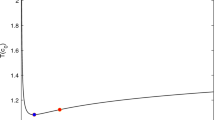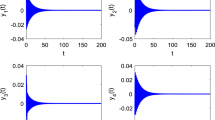Abstract
In this paper, we investigate the global exponential stability of delayed neural network systems. For this purpose, the activation functions are assumed to be globally Lipschitz continuous. The properties of norms and the relationship of homeomorphism are adjusted to ensure the existence as well as the uniqueness of the equilibrium point. Then by employing suitable Lyapunov functional, some delay-independent sufficient conditions are derived for exponential convergence toward global equilibrium state associated with different input sources. The obtained results are shown to be more general and less restrictive than the previous results derived in the literature. Lastly, a number of examples are provided to demonstrate the validity of the results proposed.






Similar content being viewed by others
References
Abarbanel H (1996) Analysis of observed chaotic data. Springer, New York
Arik S (2000) Global asymptotic stability of a class of dynamical neural networks. IEEE Trans Circuits Syst I 47:568–571
Arik S (2002) An improved global stability result for delayed cellular neural networks. IEEE Trans Circuits Syst I 49:1211–1214
Arik S (2004) An analysis of exponential stability of delayed neural networks with time varying delays. Neural Netw 17:1027–1031
Bergh F, Engelbrecht A (2006) A study of particle swarm optimization particle trajectories. Inf Sci 176:937–971
Bisler A (2004) An associative memory for autonomous agents. In: Proceedings of 4th international conference on intelligent systems design and applications, pp 765–770
Cai Z (2004) Intelligent control, vol II. Publish House of Electronic Industry
Campana E, Fasano G, Pinto A (2006) Dynamic system analysis and initial particles position in particle swarm optimization. In: Proceedings of the IEEE swarm intelligence symposium, pp 202–209
Cao J (2001) Global stability conditions for delayed CNNs. IEEE Trans Circuits Syst I 48:1330–1333
Cao J, Song Q (2006) Stability in Cohen-Grossberg type BAM neural networks. Nonlinearity 19(7):1601–1617
Cao J, Wang J (2003) Global asymptotic stability of a general class of recurrent neural networks with time—varying delays. IEEE Trans Circuits Syst I 50:34–44
Cao J, Wang J (2005) Global exponential stability and periodicity of recurrent neural networks with time delays. IEEE Trans Circuits Syst I 920–931
Chu T, Zhang C (2007) New necessary and sufficient conditions for absolute stability of neural networks. Neural Netw 20:94–101
Chu T, Zhang C, Zhang Z (2003) Necessary and sufficient condition for absolute stability of normal neural networks. Neural Netw 16:1223–1227
Forti M, Tesi A (1995) New conditions for global stability of neural networks with application to linear and quadratic programming problems. IEEE Trans Circuits Syst I 42:354–365
Ge SS (2001) Stable adaptive neural network control. Kluwer, Norwell
He Y, Wang Q, Wu M, Lin C (2006) Delay-dependent state estimation for delayed neural networks. IEEE Trans Neural Netw 17:1077–1081
Hu S, Wang J (2002) Global exponential stability of continuous-time interval neural networks. IEEE Trans Circuits Syst I 49:1334–1347
Huang H, Teng Z (2005) A new criterion on global exponential stability for cellular neural networks with multiple time-varying delays. Phys Lett A 338:461–471
Inoue T, Abe S (2001) Fuzzy support vector machines for pattern classification. In: Proceedings of the international joint conference on neural networks (IJCNN’01), vol 2, Jul, pp 15–19
Khalil H (1998) Nonlinear systems. Macmillan, New York
Li Z (2008) Adaptive neural-fuzzy control of uncertain constrained multiple coordinated nonholonomic mobile manipulators. Eng Appl Artif Intell 21(7):985–1000
Li X, Huang L, Zhu H (2003) Global stability of cellular neural networks with constant and variable delays. Nonlinear Anal 53:319–333
Li Z, Gu J, Ming A, Xu C, Shimojo M (2006) Intelligent complaint force/motion control of nonholonomic mobile manipulator working on the non-rigid surface. Neural Comput Appl 15(3–4):204–216
Liao X, Chen G (2002) LMI-based approach for asymptotically stability analysis of delayed neural networks. IEEE Trans Circuits Syst I 49:1033–1039
Lu W, Rong L, Chen T (2003) Global convergence of delayed dynamical systems [J]. Int J Neural Syst I 13:1–12
Mohamad S, Gopalsamy K (2003) Exponential stability of continuous-time and discrete-time cellular neural networks. Appl Math Comput 135:17–38
Rhodes B (2000) Margin notes: Building a contextually aware associative memory. In: Proceedings of the international conference on intelligent user interfaces, pp 9–12
Singh V (2007) Improved global robust stability criterion for delayed neural networks. Chaos Solitons Fractals 31:224–229
Song Q (2008) Exponential stability of recurrent neural networks with both time-varying delays and general activation functions via LMI approach. Neurocomputing 71:2823–2830
Wang J, Lee C (2002) Self-Adaptive neuro-fuzzy inference systems for classification applications. IEEE Trans Fuzzy Syst 10(6):790–802
Wu H (2008) Global exponential stability of Hopfield neural networks with delays and inverse Lipschitz neuron activations. Nonlinear Anal Real World Appl. doi:10.1016/j.nonrwa. 04.016
Xu S, Lam J (2006) A new approach to exponential stability analysis of neural networks with time-varying delays. Neural Netw 19:76–83
Xu S, Chu Y, Lu J (2006) New results on global exponential stability of recurrent neural networks with time-varying delays. Phys Lett A 352(4–5):371–379
Yucel E, Arik S (2007) Novel result for global robust stability of delayed neural networks. Sci Direct 06:052
Author information
Authors and Affiliations
Corresponding author
Additional information
This work was supported by the National Natural Science Foundation of China (50975059/61005080), China Postdoctoral Special Science Foundation (201104405), China Postdoctoral Science Foundation (20100480994), and the “111” Project (B07018).
Rights and permissions
About this article
Cite this article
Gao, H., Song, X., Ding, L. et al. New conditions for global exponential stability of continuous-time neural networks with delays. Neural Comput & Applic 22, 41–48 (2013). https://doi.org/10.1007/s00521-011-0745-9
Received:
Accepted:
Published:
Issue Date:
DOI: https://doi.org/10.1007/s00521-011-0745-9




